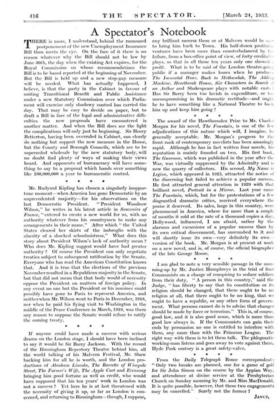• Mr. Rudyard Kipling has chosen a singularly inoppor- tune
moment—when America has gone Democratic by an unprecedented majority—for his observations on the last Democratic President. "President Woodrow Wilson," he writes in his latest article in Souvenirs of France," entered to create a new world for us, with no authority whatever from his countrymen to make any arrangements in their name." After which "the United States cleared her skirts of the imbroglio with the alacrity of a shocked schoolmistress." What does this story about President Wilson's lack of authority mean ? Who does Mr. Kipling suggest would have- had greater authority ? Of course the President can only negotiate treaties subject to subsequent ratification by the Senate. Everyone who has read the American Constitution knows that. And it is true that the elections of the previous November resulted in a Republican Majority in the Senate, but that did not mean that that body would of necessity oppose the President on matters of foreign policy. In any event no one but the President or his nominee could possibly have gone to Paris to represent America, and neither when Mr. Wilson went to Paris in December, 1918, nor when he paid his flying visit to Washington in the middle of the Peace Conference in March, 1919, was there any reason to suppose the Senate would refuse to ratify the coming treaty.






































 Previous page
Previous page